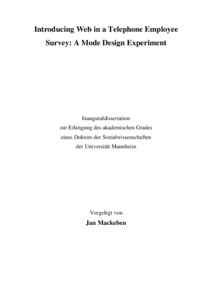|
Introducing web in a telephone employee survey: a mode design experiment
Mackeben, Jan
![[img]](https://madoc.bib.uni-mannheim.de/67913/1.hassmallThumbnailVersion/Inauguraldissertation_Jan_Mackeben_v2.pdf)  Vorschau |
|
PDF (Dissertation)
Inauguraldissertation_Jan_Mackeben_v2.pdf
- Veröffentlichte Version
Download (2MB)
|
|
URN:
|
urn:nbn:de:bsz:180-madoc-679132
|
|
Dokumenttyp:
|
Dissertation
|
|
Erscheinungsjahr:
|
2024
|
|
Ort der Veröffentlichung:
|
Mannheim
|
|
Hochschule:
|
Universität Mannheim
|
|
Gutachter:
|
Keusch, Florian
|
|
Datum der mündl. Prüfung:
|
10 September 2024
|
|
Sprache der Veröffentlichung:
|
Englisch
|
|
Einrichtung:
|
Fakultät für Sozialwissenschaften > Social Data Science and Methodology (Keusch 2022-)
|
|
Lizenz:
|
 Creative Commons Namensnennung 4.0 International (CC BY 4.0)
Creative Commons Namensnennung 4.0 International (CC BY 4.0)
|
|
Fachgebiet:
|
300 Sozialwissenschaften, Soziologie, Anthropologie
|
|
Freie Schlagwörter (Englisch):
|
web , telephone , mixed-mode , nonresponse , coverage
|
|
Abstract:
|
My dissertation explores the integration of web-based data collection into employee surveys traditionally conducted via telephone, through three experimental studies. The first study evaluates the impact of introducing a web mode into the refreshment sample of an employee survey, comparing a single-mode telephone design with a sequential web-telephone mixed-mode design. The key findings show that while the mixed-mode design increased response rates and offered potential cost savings, it also led to higher nonresponse bias compared to the telephone-only design. The second study investigates an employee panel survey, analyzing the effects of a mixed-mode design on response rates, nonresponse bias, and cost efficiency. The results indicate that the mixed-mode approach not only improved response rates and reduced costs but also maintained comparable levels of nonresponse bias relative to the single-mode design. Additionally, an experiment testing the effect of mentioning follow-up telephone contact in the web survey invitation letter found no significant impact on participation. The third study addresses the challenges of telephone-based employee surveys, particularly in terms of coverage and nonresponse biases. A sequential web-to-telephone mixed-mode design was implemented in the fourth and fifth waves of employee refreshment samples. While this approach improved response rates and reduced data collection costs, it also increased overall selection bias, primarily due to heightened nonresponse bias in the web mode. Across all three studies, mixed-mode designs demonstrated significant cost-saving potential but also revealed trade-offs, particularly concerning nonresponse and selection biases.
|
|
Übersetzter Titel:
|
Die Aufnahme des Webs in eine telefonische Beschäftigtenbefragung: ein Mode-Design Experiment
(Deutsch)
|
 | Dieser Eintrag ist Teil der Universitätsbibliographie. |
 | Das Dokument wird vom Publikationsserver der Universitätsbibliothek Mannheim bereitgestellt. |
 Suche Autoren in Suche Autoren in
Sie haben einen Fehler gefunden? Teilen Sie uns Ihren Korrekturwunsch bitte hier mit: E-Mail
Actions (login required)
 |
Eintrag anzeigen |
|
|
